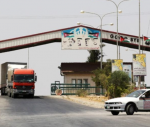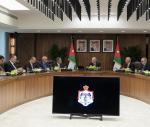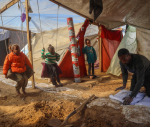You are here
Remembering Madeleine Albright
Apr 11,2022 - Last updated at Apr 11,2022
My first dealings with Madeleine Albright were at the 1988 Democratic Convention. I was representing the presidential campaign of Rev. Jesse Jackson, while she represented the Democratic nominee, Michael Dukakis. The nominee’s team had written rather stale platform language about the Israeli-Palestinian conflict, speaking only about support for Israel and vaguely endorsing the Camp David Accords. Palestinians weren’t mentioned at all.
Jackson had won enough delegates during the primaries to earn the right to introduce and debate a minority plank. The language we sought to include in the platform called for “mutual recognition and self-determination for both Israelis and Palestinians”. Madeleine was to convince me to withdraw our plank. We argued. At one point, I tested her with a lukewarm compromise. I noted that as the platform called for endorsing Camp David, why not just use the language from the Accords, i.e., “the principle of land for peace and recognising the legitimate rights of the Palestinian people”. That, I was told, rather forcefully, was a non-starter. The Dukakis campaign did not want the “P-word” in the platform nor to discuss the matter publicly. Seeing no possibility for compromise, we took our plank to the full convention and had the first-ever debate on Palestinian rights at a national party convention.
In 1995, at the second White House Israeli-Palestinian signing ceremony, as PLO Chair Yasser Arafat and Israeli Prime Minister Yitzhak Rabin shook hands, I spotted Madeleine. She hugged me saying, “This isn’t just a day for them. It’s for us too,” a gracious gesture in a city not known for them, particularly meaningful coming from someone who had been such a fierce adversary.
During her tenure as Secretary of State, we interacted on a number of occasions. She regularly briefed Arab Americans on developments in the search for peace. She was responsive to our concerns with settlement expansion and outraged by the Israeli authorities’ treatment of Arab Americans, especially those of Palestinian descent, as they flew into Ben Gurion Airport. She personally raised the issue with her Israeli counterparts and expressed anger that the practice continued.
In the late 1990s my son, who had been running a human rights project for lawyers in occupied Palestine, was asked to join the State Department in Near East Affairs. A few pro-Israel groups took umbrage and sought to have him removed from the post. Albright let it be known that she was enraged and said, “We cannot let them win this. It will be devastating if they do.” She defended my son and insisted that the Department needed more Arab Americans, not fewer.
Around the same time, she convened a meeting at the Department for Arab Americans and American Jews to update them on problems in the “peace process”. At the meeting’s end, she asked me back to her office for a private chat. She noticed, for the first time, looking around the room at the 10 Arab Americans and 10 American Jews, that her State Department “peace team” was almost all Jewish. She asked why I had never raised concern about this imbalance, especially after the treatment of my son. I told her that while pro-Israel groups might do this, it was not something Arab Americans could or would do.
In 2006, Albright published “The Mighty and the Almighty,” a treatment of the role of religion in foreign policy. She asked me to interview her and moderate the discussion at her book launch and at another event in Michigan. What impressed me most about the book and these discussions was the way she addressed her oft-quoted comments that appeared to dismiss the impact of US sanctions on Iraqi children. She apologised for the comments, they were off-hand and flippant, and the policy, which while intended to contain Saddam Hussein had instead taken a grave toll on innocent civilians. She noted that the comments and policy had long haunted her.
I remember Madeleine Albright, not for a quote and policy she regretted or for our fierce policy disagreements, but for the smart, tough and thoughtful woman she could be, and for her ability to acknowledge past errors and be gracious with former sparring partners. That is the person I will remember.
The writer is president of the Washington-based Arab American Institute













